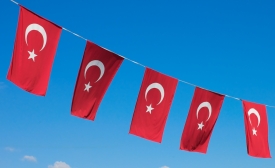tunisia
Turkey’s public diplomacy has gained increasing prominence in the news over the past month, even in the weeks prior to the earthquake that hit Eastern Turkey. Changes in the political landscape have resulted in significant changes to Turkey’s international standing in the world. The theme that dominated news from Turkey’s Today’s Zaman throughout the month of October was this Muslim-majority nation with a secular democratic government and a vibrant Islamic culture.
Tunisians woke up this week to a new reality: for the first time in their country's history, an Islamist party had emerged as an electoral winner...Gannouchi has even reassured Western countries that under an Islamic government, Tunisia will continue to welcome foreign investment and foreign tourists.
Fresh protests rocked...This time, the public anger revolved around the broadcasting of a controversial French-Iranian film...The controversy surrounding the broadcasting prompted a debate on freedom of speech and respect for religious beliefs in the post-revolution Tunisia.

Sherine B. Walton, Editor-in-Chief
Naomi Leight, Managing Editor
Tracy Bloom, Associate Editor
Sarah Myers, Associate Editor
Turkey could be a role model due to the many similarities between the country, a model that combines Islam with modernity, and Tunisia, Tunisian leader Rashid al-Ghannushi suggested...“I dream of a free, democratic, peaceful Tunisia, a country that can protect its developing identity,”
Young adults helping to shape the future of the Middle East and North Africa will meet the Deputy Prime Minister, Nick Clegg, at an event in London organised by the British Council. Their trip to the UK is part of the British Council’s work with young people around the world, and will help to inform the international response to the changing political landscape in the region.
Tunisia has little to lose in a go-for-broke strategy to bring back visitors. Like Egypt, its bigger neighbour to the east, the Arab Spring has garnered it a lot of Western admirers but has frightened sight-seers and beach denizens.
Most accounts from rights activists as well as journalists on the scene and sociologists analyzing the situation clearly show that Facebook had an enormous influence on the start and spread of the uprisings, as well as their apparent domino effect. It served a primary means of communication.







